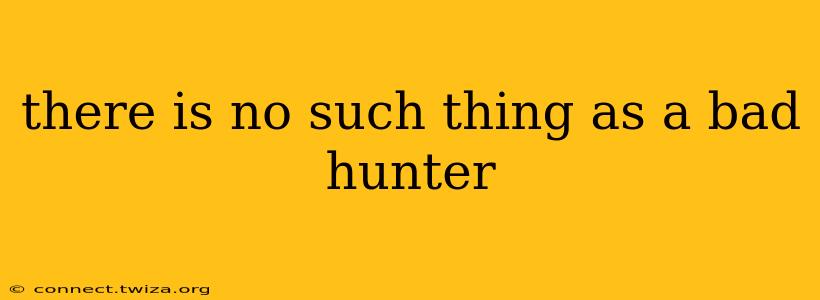There's No Such Thing as a Bad Hunter: Debunking the Myth and Exploring Hunting Ethics
The statement, "There's no such thing as a bad hunter," is a provocative one, sparking debate among seasoned hunters and newcomers alike. While it might seem overly simplistic, it highlights a crucial point: ethical hunting practices are paramount, and a hunter's skill is only one part of the equation. This article will delve into what constitutes responsible hunting, address common misconceptions, and explore the multifaceted nature of ethical hunting.
What Does it Mean to be a "Good" Hunter?
The idea of a "good" hunter transcends mere proficiency with a firearm or bow. It's about embracing a holistic approach that respects the animal, the land, and the hunting community. A good hunter embodies several key characteristics:
- Respect for the Animal: This is foundational. A good hunter understands the animal's role in the ecosystem, strives for a clean, ethical kill, and minimizes suffering. They treat the harvested animal with respect, utilizing all usable parts and avoiding waste.
- Knowledge and Skill: Proficiency in tracking, stalking, and marksmanship is essential for a clean, humane harvest. This involves understanding the animal's behavior, habitat, and the best hunting techniques for the specific situation. Continuous learning and improvement are key.
- Conservation Ethic: Good hunters are strong conservationists. They understand the importance of sustainable hunting practices, supporting wildlife management programs, and advocating for habitat preservation. They respect regulations and actively participate in conservation efforts.
- Safety First: Safety is non-negotiable. Good hunters prioritize firearm safety, adhering strictly to all safety protocols and ensuring the well-being of themselves and others in the hunting party.
- Fair Chase: Fair chase ethics emphasize hunting animals under natural conditions, without the use of artificial aids that give an unfair advantage (e.g., baiting in some jurisdictions, spotlights). This ensures a challenging and ethical hunt.
- Respect for Landowners and Fellow Hunters: Good hunters obtain proper permission before hunting on private land, respect the property, and leave no trace. They are courteous and respectful to fellow hunters and landowners.
But What About Hunters Who Don't Get a Kill? Are They "Bad" Hunters?
Absolutely not. A lack of success in harvesting an animal doesn't equate to being a bad hunter. Hunting is challenging, and many factors influence the outcome, including weather, animal behavior, and the hunter's skill level. A hunter who prioritizes ethical practices, respects the animals and the land, and learns from each experience is a good hunter, regardless of the outcome of a specific hunt.
What About Hunters Who Make Mistakes?
Everyone makes mistakes, even experienced hunters. The key is acknowledging the mistake, learning from it, and striving to do better in the future. A good hunter embraces self-reflection and continuous improvement, acknowledging that hunting is a continuous learning process.
How Can I Become a Better Hunter?
Becoming a better hunter involves continuous learning and improvement. Consider these actions:
- Take a Hunter Safety Course: This is fundamental and ensures you understand safety protocols and ethical hunting practices.
- Seek Mentorship: Learn from experienced hunters who can share their knowledge and guide your development.
- Practice Regularly: Improve your shooting skills and practice tracking and stalking techniques.
- Stay Informed: Stay up-to-date on hunting regulations and wildlife management practices.
- Respect the Land and Wildlife: Remember that responsible hunting is about more than just harvesting game; it's about stewardship of the land and its wildlife.
In conclusion, the statement "There's no such thing as a bad hunter" is a powerful reminder that ethical conduct, respect, and conservation are far more important than simply bagging an animal. While skill is certainly a valuable component of hunting, it's the commitment to ethical principles and responsible practices that truly defines a good hunter.
